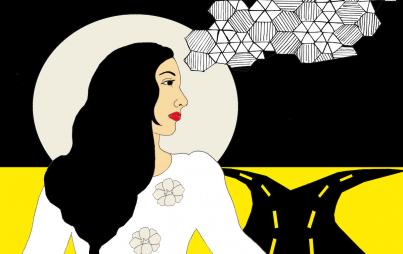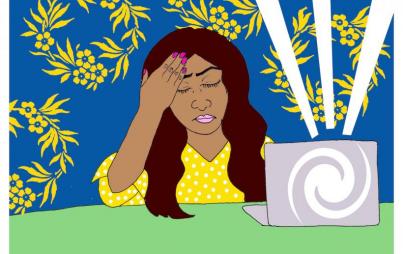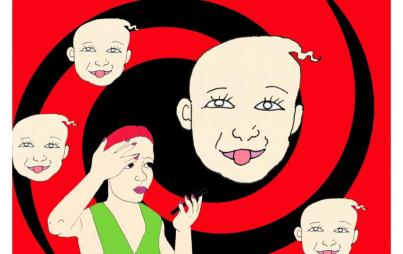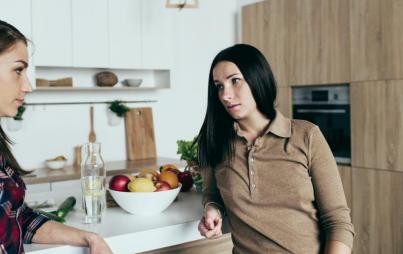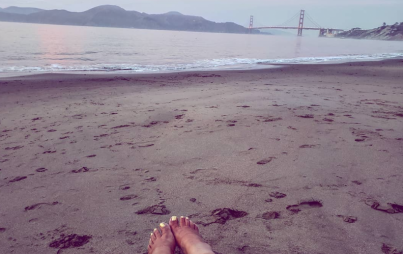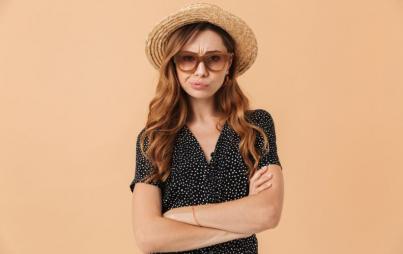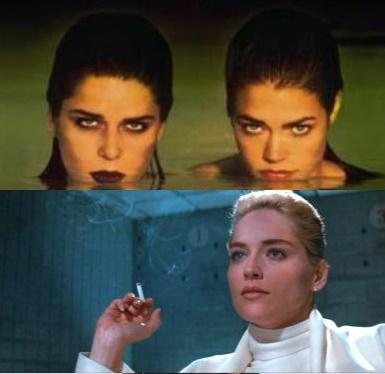
Credit: Wikimedia Commons
This just in! Our society routinely sidelines and degrades people who happen to dig both genders. Not surprisingly, one medium for all the negative nonsense is the media, which has frequently portrayed bisexuality as something fake and/or nuts (which we think is stupid and/or annoying).
Here are three particularly powerful tropes that have helped to shape how we see bisexuals in a really lame way:
The Kinky Faux-Bi Woman Who Turns on Men
Miley Cyrus using lip-locks with women to titillate men is the most modern incarnation of this trope—but it traces back to a time long before the dawn of Miley (or, for that matter, her smooching partner Katy Perry, whose "provocative" desire to kiss girls is yet another example).
Few films embody this theme more powerfully than Basic Instinct. In it, Sharon Stone plays Catherine Tramell, a hyper-sexualized would be-serial killer who fools around with a hot, vaguely masculine lookalike blonde named Roxie. The relationship is used first to announce Tramell's kinky sexuality, and then to seduce the lead male character, Nick Curran—who at one point watches lustily while Tramell feels Roxie up. The fantasy is fulfilled when the three go to a club and Curran seduces Tramell away from a pissed-off Roxie, who then watches the two enjoy a sex romp (the message: watch and learn how the men do it, girl).
Wild Things also plays with this trope. The steamy film features Denise Richards and Neve Campbell as duplicitous teens who use girl-on-girl action to distract men as part of a murderous plot—once in a pool while a male police detective character creepily watches, and then to seduce to a high-school teacher into a threesome. The implication is that both actually like men, but utilize faux bisexualism to get what they want from guys who find it hot.
The subtext: Bisexuality among women is just a ploy to get the attention of dudes.
The Wild Chick
This gentler offshoot of the "psycho lesbian" trope involves the portrayal of bisexuals as sexually loose and a little crazy—but in a fun way! The prototype for this is Rent's Maureen, a free-wheeling, insensitive bohemian performance artist who sleeps around with men and women, and doesn't give a damn what it does to her lesbian partner. Brittany in Glee is another example; the air-headed cheerleader has trysts with both sexes seemingly because she's so out-there, she thinks eh, why not? Ditto Phoebe Buffay in Friends, another charmingly wild character who alludes to liking women.
The subtext: Bisexuals, and women in particular, are fun-loving sex freaks out for a good time, but nothing serious.
The Actually Gay Bisexual
Films and TV have a hard time depicting things outside the boxes of "straight" or "gay." Both characters in Brokeback Mountain, for instance, could be seen as bisexual, but instead were portrayed as closeted gays and sold to the public that way. Similarly, The New York Times cited an episode of Sex and the City in which Carrie muses of an openly bi character that he's just on a "layover to Gaytown."
The subtext: Bisexuals are just confused or experimenting, but will eventually end up embracing their true gay identity.
The good news in all this? We are starting to see better depictions of bisexual characters in TV and film (including, recently, the fantastic M. Gustave in The Grand Budapest Hotel). The New York Times article ended with similarly promising news about the younger generation embracing less damaging ideas about what it means to be bi.
As always, it seems, art imitates life imitates art—and both life and art are still struggling to treat bisexuality as the real, not-nuts identity it is.

